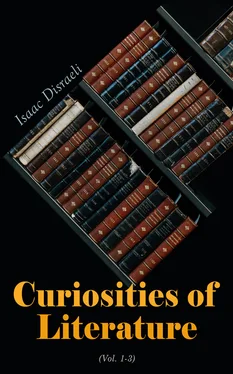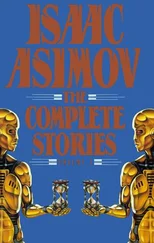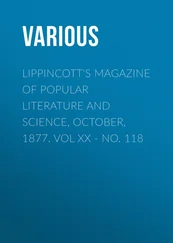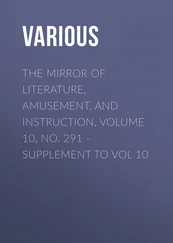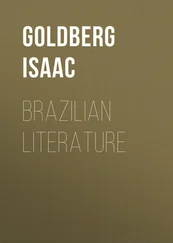Isaac Disraeli - Curiosities of Literature (Vol. 1-3)
Здесь есть возможность читать онлайн «Isaac Disraeli - Curiosities of Literature (Vol. 1-3)» — ознакомительный отрывок электронной книги совершенно бесплатно, а после прочтения отрывка купить полную версию. В некоторых случаях можно слушать аудио, скачать через торрент в формате fb2 и присутствует краткое содержание. Жанр: unrecognised, на английском языке. Описание произведения, (предисловие) а так же отзывы посетителей доступны на портале библиотеки ЛибКат.
- Название:Curiosities of Literature (Vol. 1-3)
- Автор:
- Жанр:
- Год:неизвестен
- ISBN:нет данных
- Рейтинг книги:3 / 5. Голосов: 1
-
Избранное:Добавить в избранное
- Отзывы:
-
Ваша оценка:
- 60
- 1
- 2
- 3
- 4
- 5
Curiosities of Literature (Vol. 1-3): краткое содержание, описание и аннотация
Предлагаем к чтению аннотацию, описание, краткое содержание или предисловие (зависит от того, что написал сам автор книги «Curiosities of Literature (Vol. 1-3)»). Если вы не нашли необходимую информацию о книге — напишите в комментариях, мы постараемся отыскать её.
Curiosities of Literature (Vol. 1-3) — читать онлайн ознакомительный отрывок
Ниже представлен текст книги, разбитый по страницам. Система сохранения места последней прочитанной страницы, позволяет с удобством читать онлайн бесплатно книгу «Curiosities of Literature (Vol. 1-3)», без необходимости каждый раз заново искать на чём Вы остановились. Поставьте закладку, и сможете в любой момент перейти на страницу, на которой закончили чтение.
Интервал:
Закладка:
When my father, many years afterwards, made the acquaintance of Sir Walter Scott, the great poet saluted him by reciting a poem of half-a-dozen stanzas which my father had written in his early youth. Not altogether without agitation, surprise was expressed that these lines should have been known, still more that they should have been remembered. "Ah!" said Sir Walter, "if the writer of these lines had gone on, he would have been an English poet." 2
It is possible; it is even probable that, if my father had devoted himself to the art, he might have become the author of some elegant and popular didactic poem, on some ordinary subject, which his fancy would have adorned with grace and his sensibility invested with sentiment; some small volume which might have reposed with a classic title upon our library shelves, and served as a prize volume at Ladies' Schools. This celebrity was not reserved for him: instead of this he was destined to give to his country a series of works illustrative of its literary and political history, full of new information and new views, which time and opinion has ratified as just. But the poetical temperament was not thrown away upon him; it never is on any one; it was this great gift which prevented his being a mere literary antiquary; it was this which animated his page with picture and his narrative with interesting vivacity; above all, it was this temperament, which invested him with that sympathy with his subject, which made him the most delightful biographer in our language. In a word, it was because he was a poet, that he was a popular writer, and made belles-lettres charming to the multitude.
It was during the ten years that now occurred that he mainly acquired that store of facts which were the foundation of his future speculations. His pen was never idle, but it was to note and to register, not to compose. His researches were prosecuted every morning among the MSS. of the British Museum, while his own ample collections permitted him to pursue his investigation in his own library into the night. The materials which he accumulated during this period are only partially exhausted. At the end of ten years, during which, with the exception of one anonymous work, he never indulged in composition, the irresistible desire of communicating his conclusions to the world came over him, and after all his almost childish aspirations, his youth of reverie and hesitating and imperfect effort, he arrived at the mature age of forty-five before his career as a great author, influencing opinion, really commenced.
The next ten years passed entirely in production: from 1812 to 1822 the press abounded with his works. His "Calamities of Authors," his "Memoirs of Literary Controversy," in the manner of Bayle; his "Essay on the Literary Character," the most perfect of his compositions; were all chapters in that History of English Literature which he then commenced to meditate, and which it was fated should never be completed.
It was during this period also that he published his "Inquiry into the Literary and Political Character of James the First," in which he first opened those views respecting the times and the conduct of the Stuarts, which were opposed to the long prevalent opinions of this country, but which with him were at least the result of unprejudiced research, and their promulgation, as he himself expressed it, "an affair of literary conscience."3
But what retarded his project of a History of our Literature at this time was the almost embarrassing success of his juvenile production, "The Curiosities of Literature." These two volumes had already reached five editions, and their author found himself, by the public demand, again called upon to sanction their re-appearance. Recognising in this circumstance some proof of their utility, he resolved to make the work more worthy of the favour which it enjoyed, and more calculated to produce the benefit which he desired. Without attempting materially to alter the character of the first two volumes, he revised and enriched them, while at the same time he added a third volume of a vein far more critical, and conveying the results of much original research. The success of this publication was so great, that its author, after much hesitation, resolved, as he was wont to say, to take advantage of a popular title, and pour forth the treasures of his mind in three additional volumes, which, unlike continuations in general, were at once greeted with the highest degree of popular delight and esteem. And, indeed, whether wePg xxviii consider the choice variety of the subjects, the critical and philosophical speculation which pervades them, the amount of new and interesting information brought to bear, and the animated style in which all is conveyed, it is difficult to conceive miscellaneous literature in a garb more stimulating and attractive. These six volumes, after many editions, are now condensed into the form at present given to the public, and in which the development of the writer's mind for a quarter of a century may be completely traced.
Although my father had on the whole little cause to complain of unfair criticism, especially considering how isolated he always remained, it is not to be supposed that a success so eminent should have been exempt in so long a course from some captious comments. It has been alleged of late years by some critics, that he was in the habit of exaggerating the importance of his researches; that he was too fond of styling every accession to our knowledge, however slight, as a discovery; that there were some inaccuracies in his early volumes (not very wonderful in so multifarious a work), and that the foundation of his "secret history" was often only a single letter, or a passage in a solitary diary.
The sources of secret history at the present day are so rich and various; there is such an eagerness among their possessors to publish family papers, even sometimes in shapes, and at dates so recent, as scarcely to justify their appearance; that modern critics, in their embarrassment of manuscript wealth, are apt to view with too depreciating an eye the more limited resources of men of letters at the commencement of the century. Not five-and-twenty years ago, when preparing his work on King Charles the First, the application of my father to make some researches in the State Paper Office was refused by the Secretary of State of the day. Now, foreign potentates and ministers of State, and public corporations and the heads of great houses, feel honoured by such appeals, and respond to them with cordiality. It is not only the State Paper Office of England, but the Archives of France, that are open to the historical investigator. But what has produced this general and expanding taste for literary research in the world, and especially in England? The labours of our elder authors, whose taste and acuteness taught us the value of the materials which we in our ignorance neglected. When my father first frequented the reading-room of the British Museum at the end of the last century, his companions never numbered half-a-dozen; among them, if I remember rightly, were Mr. Pinkerton and Mr. Douce. Now these daily pilgrims of research may be counted by as many hundreds. Few writers have more contributed to form and diffuse this delightful and profitable taste for research than the author of the "Curiosities of Literature;" few writers have been more successful in inducing us to pause before we accepted without a scruple the traditionary opinion that has distorted a fact or calumniated a character; and independently of every other claim which he possesses to public respect, his literary discoveries, viewed in relation to the age and the means, were considerable. But he had other claims: a vital spirit in his page, kindred with the souls of a Bayle and a Montaigne. His innumerable imitators and their inevitable failure for half a century alone prove this, and might have made them suspect that there were some ingredients in the spell besides the accumulation of facts and a happy title. Many of their publications, perpetually appearing and constantly forgotten, were drawn up by persons of considerable acquirements, and were ludicrously mimetic of their prototype, even as to the size of the volume and the form of the page. What has become of these "Varieties of Literature," and "Delights of Literature," and "Delicacies of Literature," and "Relics of Literature,"—and the other Protean forms of uninspired compilation? Dead as they deserve to be: while the work, the idea of which occurred to its writer in his early youth, and which he lived virtually to execute in all the ripeness of his studious manhood, remains as fresh and popular as ever—the Literary Miscellany of the English People.
Читать дальшеИнтервал:
Закладка:
Похожие книги на «Curiosities of Literature (Vol. 1-3)»
Представляем Вашему вниманию похожие книги на «Curiosities of Literature (Vol. 1-3)» списком для выбора. Мы отобрали схожую по названию и смыслу литературу в надежде предоставить читателям больше вариантов отыскать новые, интересные, ещё непрочитанные произведения.
Обсуждение, отзывы о книге «Curiosities of Literature (Vol. 1-3)» и просто собственные мнения читателей. Оставьте ваши комментарии, напишите, что Вы думаете о произведении, его смысле или главных героях. Укажите что конкретно понравилось, а что нет, и почему Вы так считаете.
